Saint James the Greater
செபதேயுவின் மகன் புனிதர் யாக்கோபு
திருத்தூதர் மற்றும் மறைசாட்சி:
பிறப்பு: கி. பி. 1ம் நூற்றாண்டு
பெத்சாயிதா, யூதேயா, ரோம பேரரசு
இறப்பு: கி. பி. 44
ஜெருசலேம், யூதேயா, ரோம பேரரசு
ஏற்கும் சமயம்:
எல்லா கிறிஸ்தவ உட்பிரிவுகளும்
முக்கிய திருத்தலங்கள்:
சந்தியாகு டி கம்போஸ்டேலா பேராலயம், கலீசியா (ஸ்பெயின்), புனித ஜேம்ஸ் பேராலயம், ஜெருசலேம், ஆர்மேனியன் குவார்ட்டர் (இஸ்ரயேல்)
நினைவுத் திருவிழா: ஜூலை 25
பாதுகாவல்:
இடங்கள் (Places):
கலீசியா (Galicia), குவாத்தமலா (Guatemala), நிக்கரகுவா (Nicaragua), ஸ்பெய்ன் (Spain), குயாகில் (Guayaquil), பேடிஸ் ஆலயம் (Betis Church), பம்பங்கா (Pampanga), படியான் (Badian), சோகோட் (Sogod), செபு (Cebu), பிலிப்பைன்ஸ் (Philippines) மெக்சிகோ நாட்டின் சில இடங்கள் (Some places of Mexico)
தொழில்கள் (Professions):
கால்நடை மருத்துவர்கள் (Veterinarians), குதிரையேற்றம் (Equestrians), விலங்கின் மென்மயிரால் பொருட்களைச் செய்து விற்பவர்கள் (Furriers), தோல் பதப்படுத்துபவர்கள் (Tanners), மருந்தாளுநர்கள் (Pharmacists), சிப்பி மீனவர்கள் (Oyster Fishers), மரம் செதுக்குபவர்கள் (Woodcarvers)
செபதேயுவின் மகன் யாக்கோபு, (James, son of Zebedee) இயேசு கிறிஸ்துவின் பன்னிரு திருத்தூதர்களுள் ஒருவர் ஆவார். முதன்முதலில் மறைசாட்சியாக மரித்த திருத்தூதர் இவரேயாவார் என்று மரபுகள் கூறுகின்றன. இவரின் பெற்றோர் செபதேயு மற்றும் சலோமி ஆவர் (Zebedee and Salome). இவர் திருத்தூதரான புனித யோவானின் (John the Apostle) சகோதரர் ஆவார். அல்பேயுவின் மகன் யாக்கோபுவிடமிருந்து (James, son of Alphaeus) இவரைப் பிரித்து காட்ட, இவர் பெரிய யாக்கோபு (James the Greater) என்றும், “இயேசுவின் சகோதரர் யாக்கோபு” (James the brother of Jesus) என்றும் அழைக்கப்படுகின்றார்.
யாக்கோபு, இயேசுவின் முதல் சீடர்களுல் ஒருவராக விவரிக்கப்படுகிறார். ஒத்தமை நற்செய்தி நூல்களின்படி இவரும் இவரின் சகோதரரான யோவானும் இயேசுவிடமிருந்து அழைப்பு பெறும்போது தங்களின் தந்தையோடு கடற்கரையில் இருந்தனர். இயேசுவின் தோற்றம் மாறியதை (Transfiguration) கண்ட மூன்று அப்போஸ்தலர்களுல் இவரும் ஒருவராவார்.
சமாரியர்கள் இயேசுவை ஏற்றுக் கொள்ளாததால் யாக்கோபுவும் யோவானும் இயேசுவிடம், “ஆண்டவரே, வானத்திலிருந்து தீ வந்து இவர்களை அழிக்குமாறு செய்யவா? இது உமக்கு விருப்பமா?” என்று கேட்டார்கள்.
அவர் அவர்கள் பக்கம் திரும்பி, அவர்களைக் கடிந்து கொண்டார். திருத்தூதர் பணிகள் 12:2ன்படி ஏரோது அரசன், யாக்கோபுவை தன் வாளால் கொன்றான். திருத்தூதர்களுல் புதிய ஏற்பாட்டில் இவரின் இறப்பு மட்டுமே பதிவு செய்யப்பட்டுள்ளது. ஆகவே பாரம்பரிய நம்பிக்கையின் படி 12 திருத்தூதர்களில் இவரே முதல் இரத்த சாட்சி என நம்பப்படுகிறது.
இவர் ஸ்பெயின் நாட்டின் பாதுகாவலராக கருதப்படுகின்றார். இவரின் கல்லறை கலீசியாவில் உள்ள சாந்தியாகோ தே கோம்போசுதேலா கத்தீடிரலில் உள்ளதாக நம்பப்படுகின்றது. பரம்பரியமாக இவரின் கல்லறைக்கு செல்லும் பக்தி முயற்சி புனித யாக்கோபுவின் பாதை என அழைக்கப்படுகின்றது. இப்பக்தி முயற்சி நடுக்காலம் முதல் பல இடங்களில் இருப்பவர்களிடம் பரவியது.
இவரின் நினைவுத் திருவிழா நாள் ஜூலை மாதம், 25ம் நாளன்று, கத்தோலிக்க திருச்சபை, ஆங்கிலிக்கம், லூதரனியம் மற்றும் சில சீர்திருத்தத் திருச்சபைகளில் கொண்டாடப்படுகின்றது. மரபுவழி திருச்சபைகளில் ஏப்ரல் மாதம், 30ம் நாளன்று, கொண்டாடப்படுகின்றது.
ஸ்பெயினில்:
பாரம்பரியப்படி கி.பி. 40ம் ஆண்டு, ஜனவரி மாதம், இரண்டாம் நாளன்று, இவருக்கு ஐபீரிய மூவலந்தீவு பகுதியில் மறைபணியாற்றிக் கொண்டிருக்கும் போது மரியாளின் காட்சி கிடைத்ததாகவும், அதன் பின்னரே இவர் எருசலேமுக்கு சென்று உயிர் துறந்ததாகவும் நம்பப்படுகின்றது. மேலும் இதன் பின் இவரின் உடல் சாந்தியாகோ தே கோம்போசுதேலா ஆலயம் அமைந்துள்ள கலீசியா கடற்கறைக்கு தேவதூதர்களால் கொண்டு வரப்பட்டதாகவும், அங்கிருந்தவர்கள் இவரின் உடலை அடக்கம் செய்ததாகவும் நம்பப்படுகின்றது. எனினும் இவரின் சீடர்களாலேயே இவரின் உடல் கொண்டுவரப்பட்டிருக்கலாம் என அறிஞர்கள் நம்புகின்றனர்.
Also known as
• Jacobus de Oudere
• Jacobus Major
• Jakobus der Ältere
• James Major
• James the Elder
• James the More
• James the son of Zebedee
• James, son of Zebedee
• Santiago de España
• Son of Thunder
• Iago, Santiago
Additional Memorials
• 30 December (translation of relics; Mozarabic rite)
• 3 January (translation of relics to the monastery of Saint Vaast)
• 30 April (Orthodox)
• 29 December (Armenian)
• 12 April (Coptic)
• 27 December (Syrian Orthodox)
Profile
Son of Zebedee and Salome, brother of Saint John the Apostle, and may have been Jesus' cousin. He is called "the Greater" simply because he became an Apostle before Saint James the Lesser. Apparent disciple of Saint John the Baptist. Fisherman. He left everything when Christ called him to be a fisher of men. Was present during most of the recorded miracles of Christ. Preached in Samaria, Judea, and Spain. First Apostle to be martyred.
The pilgrimage to his relics in Compostela became such a popular devotion that the symbols of pilgrims have become his emblems, and he became patron of pilgrims. His work in Spain, and the housing of his relics there, led to his patronage of the country and all things Spanish; for centuries, the Spanish army rode to battle with the cry "Santiago!" ("Saint James!")
Like all men of renown, many stories grew up around James. In one, he brought back to life a boy who had been unjustly hanged, and had been dead for five weeks. The boy's father was notified of the miracle while he sat at supper. The father pronounced the story nonsense, and said his son was no more alive than the roasted fowl on the table; the cooked bird promptly sat up, sprouted feathers, and flew away.
Died
• stabbed with a sword by King Herod Agrippa I in 44 at Jerusalem
• legend says his body was taken by angels, and sailed in a rudderless, unattended boat to Spain where a massive rock closed around it
• relics at Compostela, Spain
Blessed Antonio Lucci
அருளாளர் ஆண்டனியோ லூசி
போவினோ மறைமாவட்ட ஆயர்:
பிறப்பு: ஆகஸ்ட் 2, 1681
அக்நோன், இசெர்னியா, சிசிலி அரசு
இறப்பு: ஜூலை 25, 1752 (வயது 70)
போவினோ, ஃபொக்கியா, சிசிலி அரசு
ஏற்கும் சமயம்:
ரோமன் கத்தோலிக்க திருச்சபை
முக்திபேறு பட்டம்: ஜூன் 18, 1989
திருத்தந்தை இரண்டாம் ஜான் பவுல்
அருளாளர் ஆண்டனியோ லூசி, ஒரு இத்தாலிய ஃபிரான்சிஸ்கன் துறவியும், கி.பி. 1729ம் ஆண்டு முதல், கி.பி. 1752ம் ஆண்டு அவர் மரிக்கும்வரை, “போவினோ” (Bishop of Bovino) மறைமாவட்ட ஆயராக பணியாற்றியவருமாவார். தமது வாழ்நாள் முழுதும் ஏழை மக்களின் வாழ்வு மேம்பாட்டுக்காக செலவிட்ட இவர், கத்தோலிக்க திருச்சபையால் முக்திபேறு பட்டம் அளிக்கப்பட்டார்.
“ஆஞ்ஜெலோ நிக்கோலா லூசி” (Angelo Nicola Lucci) எனும் இயற்பெயர் கொண்ட ஆஞ்ஜெலோ, கி.பி. 1682ம் ஆண்டு, ஆகஸ்ட் மாதம், 2ம் தேதி பிறந்தவர் ஆவார். இவரது தந்தை ஒரு செருப்பு தைக்கும் மற்றும் தாமிர பணி செய்யும் தொழிலாளி ஆவார். அவரது பெயர், “ஃபிரான்சிஸ்கோ லூஸி” (Francesco Lucci) ஆகும். இவரது தாயார், “ஆஞ்ஜெலா பவுலான்டனியோ” (Angela Paolantonio) ஆவார்.
தமது பதினாறாம் வயதில், ஃபிரான்சிஸ்கன் துறவியரால் (Order of Friars Minor Conventual) நடத்தப்பட்ட பள்ளியில் தமது கல்வியை ஆரம்பித்தார். கி.பி. 1698ம் ஆண்டு தமது தூய துறவற வாழ்வினை தொடங்கிய இவர், “ஆன்டொனியோ” (Antonio) என்ற பெயரை தமது ஆன்மீக பெயராக ஏற்றுக்கொண்டார். தமது குருத்துவ கல்வியை “அசிசியில்” (Assisi) மேற்கொண்ட இவர், கி.பி. 1705ம் ஆண்டு குருத்துவ அருட்பொழிவு பெற்றார். மேற்கொண்டு இறையியல் முனைவர் பட்டத்திற்காக கல்வி பெற்ற லூசி, அக்நோன், ரவேல்லோ மற்றும் நேப்பிள்ஸ் (Agnone, Ravello and Naples) என்ற இடங்களில் பேராசிரியராக பணி புரிந்தார்.
திருத்தந்தை பதின்மூன்றாம் பெனடிக்ட் (Pope Benedict XIII), இவரை ஒரு கர்தினாலாக நியமிப்பார் என்று வதந்தி பரவியது. ஆனால் இது நடக்கவில்லை. மாறாக, கி.பி. 1729ம் ஆண்டு, இவரை போவினோ (Bishop of Bovino) மறைமாவட்டத்திற்கு ஆயராக திருத்தந்தை பதின்மூன்றாம் பெனடிக்ட் நியமித்தார். “நான் போவினோ ஆயராக, ஒரு சிறந்த இறையியல் மற்றும் ஒரு பெரிய துறவி தேர்வு செய்துள்ளேன்” என்று கூறிய திருத்தந்தை, தாமே அவருக்கு ஆயர் அருட்பொழிவு செய்வித்தார். 23 வருடங்கள் ஆயராக பணியாற்றிய இவர், தமது ஆயர் வருமானத்தையும் ஏழை குழந்தைகளின் மறைக்கல்வி வகுப்புகளை நிறுவுவதற்கும், தேவாலயங்களை பழுதுபார்க்கவும், தொண்டிற்காகவுமே செலவிட்டார்.
கி.பி. 1752ம் ஆண்டு, ஜூலை மாதம், 25ம் நாளன்று, அதிக ஜூரம் காரணமாக மரித்த இவரது உடல், “போவினோ பேராலயத்தில்” (Bovino Cathedral) நல்லடக்கம் செய்யப்பட்டது.
Also known as
• Angel of the Poor (references to him as bishop)
• Angelo Nicola Lucci
Profile
The son of Francesco Lucci, a cobbler and coppersmith, and Angela Paolantonio, he was raised in a pious home, taught by Franciscans, and developed a devotion to Our Lady of the Rosary. Angelo joined the Franciscan Friars Minor Conventuals in his teens, making his solemn vows in 1698 and taking the name Brother Antonio. He studied rhetoric, logic and philosophy at the Franciscan houses in the Italian cities of Venafro, Alvito and Aversa, and then theology in Agnone and Fasani; Antonio said he was grateful for his studies as the discipline required for them helped him get a quick temper under control. Ordained a priest on 19 September 1705 in Assisi, Italy. Noted theologian, biblical scholar, teacher and preacher. Doctor of theology in 1709. Regent and professor at the Franciscan school in Ravello, Italy from 1709 to 1712. Regent and professor at the Franciscan San Lorenzo school in Naples, Italy from 1713 to 1718. Franciscan Provincial in 1718. Regent and professor at the College of Saint Bonaventure in Rome, Italy from 1719 to 1729. Writer on matters of theology, philosophy and history. At the request of Pope Benedict XIII, he became a theological consultant to the Holy Office, consultant to the Lateran synod, and wrote against Jansenism for Benedict XIII.
Chosen reluctant bishop of Bovino, Italy in December 1728; consecrated on 2 July 1729 in Saint Peter’s Basilica, he served his diocese the remaining 23 years of his life. Known for his charity to the poor (he gave away most of his personal income), and the creation of schools and catechism classes for the young and the poor, theological and training in public speakign for Mpriests, all of whom had been much neglected in a tiny diocese beset with political problems. He travelled through the diocese, re-equipped and repaired churches, enforced discipline on his clergy who had fallen into worldly ways, raised the standards and revilatized the liturgy and parish life throughout his see, and even visited hermits to ensure that their lives were in line with Church teachings. His reforms were opposed by local lords and princes who had fostered and who benefitted from the lax and worldly ways of the priests and people, who wanted to control appointments of clergy and offices, and who tried to treat Church property as their own. Bishop Antonio fought them at every step, always defending the poor and outcast, and the rights of the Church, and ignoring their demands for the appointment of friends and followers to positions that he filled with more qualified candidates. He restored the cathedral, which had fallen into disrepair, and supported a resumption of devotions. Somewhere along the way he managed to write Manual of Theology which was used as a standard textbook for many years, and in 1740 a book about the saints and beati from the first 200 years of the Franciscan Conventuals.
Saint Alphonsus de Liguori wrote about him, praising the work he had done, and declaring him a holy man. Saint Francesco Antonio Fasani testified at diocesan hearings about the holiness of Blessed Antonio. When Benedict XIII chose Brother Antonio as bishop of Bovino, he wrote “I have chosen as bishop of Bovino an eminent theologian and a great saint.”
Born
2 August 1681 in Agnone, Isernia, kingdom of Sicily (in modern Italy) as Angelo Nicola Lucci
Died
• 25 July 1752 in Bovino, Foggia, Italy of an extremely high fever
• buried in the cathedral of Bovino
Beatified
18 June 1989 by Pope John Paul II
Saint Christopher
புனித கிறிஸ்டோபர்
மறைசாட்சி, வாகன ஓட்டுனர்களுக்கு பாதுகாவலர்
பிறப்பு
2 ஆம் நுற்றாண்டு,கானான்(kanan)
இறப்பு
கி.பி.251.
இவருக்கு ரெப்ரோபூஸ் (Reprobus) என்ற பெயரும் உண்டு. பல மக்களை மனமாற்றியதால், இவரை டேசியூஸ் அரசன் (Decius) கொல்ல ஆணையிட்டான். இவர் வழித்துணை பாதுகாவலராக போற்றப்படுகின்றார். அதற்கு ஒரு வரலாறு உண்டு.
ஒருநாள் இவர் ஆற்றைக் கடக்கும்போது, ஒரு சிறு பிள்ளை வந்து என்னையும் தூக்கி, கரையை கடக்க உதவுங்கள் என்றது. இவரும் அக்குழந்தையே தோளில் சுமந்துகொண்டு ஆற்றில் இறங்கினார். ஆனால் சிறிது தூரம் சென்றவுடன் குழந்தை கனக்க ஆரம்பித்தது. அவரால் வலியை பொறுக்கமுடியவில்லை. இருந்தும் கீழே விட்டுவிடாமல் கரையை கடந்தார். இறக்கியவுடன் அக்குழந்தை "நான் தான் கிறிஸ்து" என்று சொல்லி மறைந்தது.
நீண்ட பயணம் செய்பவர், இவரிடம் ஜெபித்த போது பல நன்மைகளை பெற்றுள்ளனர். வயலில் வேலை செய்பவர்களூம் தண்ணீர் வேண்டி ஜெபித்த போது மழையை பெற்றுள்ளனர். ஐரோப்பாவில் இவரின் பக்தி அதிகமாக பரவியுள்ளது.
Also known as
Christobal, Christoval, Cristobal, Kester, Kitt, Kitts, Offero
Additional Memorial
• 25 July (Roman calendar)
• 9 March (Greek calendar)
• 9 May (some Eastern calendars)
• 16 November (Cuba)
• 10 July (some areas of Spain)
Profile
Third century martyr in the persecutions of Decius. Little else is known for sure.
His fame derives from the pious legend of him being a "Christ-bearer" (= Christopher). He was a powerfully built man who wandered the world in search of novelty and adventure. He came upon a hermit who lived beside a dangerous stream and served others by guiding them to safe places to cross. He gave Offero instruction in the truth of God. Offero took the hermit's place, but instead of guiding travellers, he carried them safely across the stream.
One day he carried a small child across the stream; the child's weight nearly crushed him. When they arrived on the other side, the child revealed himself as Christ, and he was so heavy because he bore the weight of the world on himself. He then baptised Offero with water from the stream. Christopher's service at the stream led to his patronage of things related to travel and travellers, people who carry things, etc. One of the Fourteen Holy Helpers.
Born
at Canaan as Offero
Died
martyred c.251
Name Meaning
Christ-bearer
Saint Euphrasia
Also known as
Eufrasia, Eupraxia
Profile
Born to the Roman nobility, the daughter of Antigonus, senator of Constantinople. Related to Roman Emperor Theodosius I who finished the conversion of Rome to a Christian state. Her father died soon after Euphrasia was born; she and her mother became wards of the emperor.
When Euphrasia was only five years old, the emperor arranged a marriage for her to the son of a senator. Two years later, she and her mother moved to their lands in Egypt. There, while still a child, Euphrasia entered a convent; her mother died soon after of natural causes, leaving the novice an orphan.
At age twelve Euphrasia was ordered by the emperor Aracdius, successor to Theodosius, to marry the senator's son as arranged. Euphrasia requested that she be relieved of the marriage arrangement, that the emperor sell off her family property, and that he use the money to feed the poor and buy the freedom of slaves. Arcadius agreed, and Euphyrasia spent her life in the Egyptian convent.
Noted for her prayer life, and constant self-imposed fasting; she would sometimes spend the day carrying heavy stones from one place to another to exhaust her body and keep her mind off temptations. She suffered through gossip and false allegations, much of it the result of being a foreigner in her house. She is held up as a model by Saint John Damascene.
Born
380
Died
420 of natural causes
Saint Cugat del Valles
Also known as
Cobad, Cocoba, Cocobas, Cophan, Cougat, Covade, Cucao, Cucufa, Cucufas, Cucufat, Cucufate, Cucuphas, Cucuphat, Culgat, Guinefort, Gulnefort, Qaqophas, Qoqofas, Quiquefat, Quiquenfat
Additional Memorials
• 16 February (translation of relics to Léberan)
• 25 August (translation of relics to Saint-Denis)
Profile
Born to an illustrious family in north Africa. He fled to Spain to avoid the persecutions of Diocletian. Spiritual teacher of Saint Juliana of Mataro and Saint Semproniana of Mataro. Arrested for his faith in Barcelona, he was hauled before Governor Dacian and ordered to sacrifice to idols; when he refused, he was imprisoned, tortured and executed. Martyr. Prudentius mentions him in his Hymns.
Born
North Africa
Died
• beheaded in 304 near Barcelona, Spain
• some relics enshrined in Paris, France
• some relics enshrined in the church of the monastery of Léberan, archdiocese of Strasbourg, France by Abbot Fulrad
• relics moved from the Léberan monastery to the Abbey of Saint-Denis in 835
• the monastery of Saint Cugat del Valles was later founded on the site of his martyrdom
Saint María del Carmen Sallés Barangueras
Also known as
Carmen of Jesus
Profile
Second of ten children born to José Sallés y Vall and Francisca Barangueras y de Planell who were pious people. By age 16 she was engaged in an arranged marriage, but convinced her family of a desire for religious life. She began her novitiate in the Adoration Sisters on 7 May 1869 in Barcelona, Spain; she began working with the poor and the outcast. Having shown skills as a teacher, on 8 May 1871 she joined the Dominicans of the Annunciation, a teaching order; she made her final vows in August 1872. Founded the Conceptionist Missionary Sisters of Education (Concepcionistas Misioneras de la Enseñanza) on 22 February 1892, and spent the rest of her life working for its work and expansion. They continue their good work today with over 500 sisters in 60+ houses.
Born
9 April 1848 in Vic, Barcelona, Spain
Died
25 July 1911 in Madrid, Spain of natural causes
Canonized
21 October 2012 by Pope Benedict XVI
Blessed Manuel Vázquez Alfalla
Profile
Ordained a priest of the archdiocese of Granada, Spain on 17 December 1892; an excellent student, he completed six years of seminary work in five. He served in various offices in the Spanish towns of Motril, Salobreña, and Lobres where he was known for working with local charities; he was a vice-present of the Spanish Red Cross. From 1907 to 1922 he served in Immaculate Conception parish in Buenos Aires, Argentina before returning to Motril. Martyred in the Spanish Civil War.
Born
15 July 1863 in Motril, Granada, Spain
Died
• shot on 25 July 1936 in Motril, Granada, Spain
• buried in a common grave with others executed by the militia in Motri
Venerated
28 November 2019 by Pope Francis (decree of martyrdom)
Blessed Pietro Corradini of Mogliano
Profile
At age 13 young Pietro had a vision of the world in ruins which was rescued by a monk. He studied law in Perugia, Italy, but gave it up to join the Franciscans in 1467. Priest. Travelling preacher in the Marches region of Italy and on Crete where he served as commissioner in 1472. Worked with Saint James of the Marches. Friend of Blessed Camilla Battista. Preached Crusade against the Turks. Franciscan Provincial of the Marches on three occasions. Franciscan Provincial minister to the Vatican.
Born
1435 in Mogliano, Macerata, Italy
Died
during the night of 24 to 25 July 1490 near Fermo, Italy after a brief illness
Beatified
10 August 1760 by Pope Clement XIII
Blessed Mieczyslawa Kowalska
Also known as
• Maria Teresa of the Child Jesus
• Maria Teresa Kowalska
Additional Memorial
12 June as one of the 108 Martyrs of World War II
Profile
Grew up in a family of socialists. Joined the Capuchin Poor Clare nuns at the convent of Przasnysz, Poland on 12 August 1923, taking the name Maria Teresa of the Child Jesus; she made her perpetual vows in 26 June 1928. Arrested by invading Germans with her sister nuns on 2 April 1941, and sent to a concentration camp in East Prussia. Martyred by Nazis in occupied Poland for refusing to renounce her faith.
Born
1902 in Warsaw, Poland
Died
the night of 25 July 1941 in the prison camp at Dzialdowo, Warminsko-Mazurskie, Poland
Beatified
13 June 1999 by Pope John Paul II
Saint Olympiad of Constantinople
Also known as
Olympias
Profile
Friend of Saint Gregory of Nyssa and Gregory the Theologian. Married to the Prefect of Constantinople. Widowed after 20 months of marriage, she turned down further offers of marriage. Deaconess. Used her fortune to found a hospital and orphanage, and to support the women‘s religious congregation that worked in them, and with whom she lived. Spiritual student of Saint John Chrysostom; she supported him while he was in exile, and some of their correspondence has survived. Advisor to Nectriae, Patriarch of Constantinople.
Born
Constantinople
Died
408 at Nicomedia, Bithynia (in modern Turkey)
Saint Magnericus of Trier
Also known as
Magnerich, Magnerico, Magnerik, Meinrich
Profile
Grew up in the Trier, Germany residence of bishop Nicetius. Ordained by Nicetius. Accompanied the bishop into exile when Nicetius was banished by King Clotaire I as revenge for the king being excommunicated. Magnericus returned to Trier the next year. Bishop of Trier in 566. Ordained Saint Gaugericus. Gave sanctuary to bishop Theodore of Marseilles when he was exiled by Guntramnus of Burgundy in 585; spoke to King Childebert II on behalf of the bishop. Had a great devotion to Saint Martin of Tours, and built several monasteries and churches dedicated to him. Friend of Saint Gregory of Tours.
Born
c.520
Died
25 July 596 of natural causes
Blessed John Soreth
Profile
Carmelite. Studied in Paris, France. Doctor of theology in 1438. Prior-general of his order from 1451 to 1471. Wrote a famous commentary on the Rule. Issued new Constitutions in 1462. Worked to return his order to its earliest observance, and to admit convents. Spiritual director of Blessed Frances d'Amboise.
Born
c.1420 at Caen, Normandy, France
Died
1471 at Angers, France of natural causes
Beatified
1865 by Pope Pius IX (cultus confirmed)
Blessed Alexius Worstius
Profile
17th century Premonstratensian friar. Canon of the Norbertine monastery in Hradisko, Olomouc, Moravia. Abbot of Hradisko of in 1671, a position in which he served his remaining eight years. A humble and pious man, he treated his Premonstratensian brothers more as sons, endlessly concerned for their well-being and spiritual growth.
Died
• 1679 in Teplice (in the modern Czech Republic) of natural causes
• buried at the Premonstratensian convent in Doksany (in the modern Czech Republic)
• re-interred before the altar of Our Lady at the Holy Mountain pilgrimage center associated with his old monastery in Hradisko, Olomouc, Moravia in 1696
Blessed Darío Acosta Zurita
Profile
Priest in the diocese of Veracruz, Mexico. Known as an athletic, gentle and charitable man. Martyred in the persecutions of the Mexican Revolution as he was about to start a catechism class for children.
Born
14 December 1908 in Naolinco, Veracruz, Mexico
Died
shot 25 July 1931 in his parish church in Puerto de Veracruz, Veracruz, Mexico
Beatified
• 20 November 2005 by Pope Benedict XVI
• recognition celebrated by Cardinal José Saraiva Martins in a soccer stadium in Guadalajara, Mexico
Blessed Michel-Louis Brulard
Profile
Discalced Carmelite priest. Imprisoned on a ship in the harbor of Rochefort, France and left to die during the anti-Catholic persecutions of the French Revolution. One of the Martyrs of the Hulks of Rochefort.
Born
11 June 1758 in Chartres, Eure-et-Loir, France
Died
starved to death on 25 July 1794 aboard the prison ship Deux-Associés, in Rochefort, Charente-Maritime, France
Beatified
1 October 1995 by Pope Saint John Paul II
Blessed Jaume Vendrell Olivella
Also known as
Brother Bernat
Profile
Member of the Benedictine Subiaco Congregation. Martyred in the Spanish Civil War.
Born
29 June 1878 in San Esteve d'Ordal, Barcelona, Spain
Died
25 July 1936 in Gelida, Barcelona, Spain
Beatified
• 13 October 2013 by Pope Francis
• beatification celebrated in Tarragona, Spain
Blessed Josep Garriga Ferrer
Profile
Priest of the archdiocese of Tarragona, Spain. Martyed in the Spanish Civil War.
Born
13 March 1872 in Cabra del Camp, Tarragona, Spain
Died
25 July 1936 in Reus, Tarragona, Spain
Beatified
• 13 October 2013 by Pope Francis
• beatification celebrated in Tarragona, Spain
Blessed Dionisio Pamplona-Polo
Also known as
Dionisio of Saint Barnabas
Profile
Piarist priest. Martyred in the Spanish Civil War.
Born
11 October 1868 in Calamocha, Teruel, Spain
Died
25 July 1936 in Monzón, Huesca, Spain
Beatified
1 October 1995 by Pope Saint John Paul II
Blessed Miquel Peiro Victori
Profile
Married layman in the archdiocese of Barcelona, Spain. Member of the Lay Dominicans. Martyred in the Spanish Civil War.
Born
7 February 1887 in Ayguafreda, Barcelona, Spain
Died
25 July 1936 in Barcelona, Spain
Beatified
28 October 2007 by Pope Benedict XVI
Blessed Antonio of Olmedo
Profile
Mercedarian friar. Missionary in Chile, bringing many to Christianity and instilling a love of devotions. Founded the Mercedarian convent of Santa Maria in Valdivia, Chile. Contracted a fatal illness while working with plague victims.
Died
plague in Chile
Saint Fagildo of Santiago
Also known as
Fagildus
Profile
Eleventh century Benedictine monk in Spain. Abbot of the monastery of San Martin de Antealtares in Santiago de Compostela, Spain.
Died
1086 of natural causes
Saint Mordeyren
Profile
No information about him has survived.
Died
• relics formerly enshrined in a chapel of the parish church Nantglyn, Wales, but they have disappeared
• turf around his chapel was cut and used as a cure for livestock diseases until at least 1699
Saint Glodesind of Metz
Profile
Engaged to a courtier who was arrested on their wedding day, and later executed. She became a nun at Metz, France and later abbess.
Died
c.608 of natural causes
Saint Theodemir of Cordoba
Also known as
Teodemiro
Profile
Monk in Moorish-controlled Andalusia. Martyred in the persecutions of Abderrahman II.
Died
• 851 in Cordoba, Spain
• buried in the choir of the church of Saint Zoilo in Cordoba
Saint Paul of Palestine
Profile
Martyred in the persecutions of Galerius. He spent his last minutes, standing at the executioner’s block, praying for his countrymen, his judges, his executioner, and the people who had come to see him die.
Died
beheaded in 308 in Palestine
Blessed Giacomo Brunforte of Falerone
Profile
Franciscan friar and priest. Confessor of Blessed Giovanni della Verna.
Born
13th century Ascoli Piceno, Italy
Died
1308 in Mogliano, Macerata, Italy of natural causes
Saint Florentius of Furcona
Profile
One of a group of soldiers martyred in the persecutions of Maximinius the Thracian.
Died
235 at Furcona, Italy
Saint Ebrulfus
Also known as
Ebrulf, Evrou, Evroult
Profile
Hermit. Founded a monastery at Saint-Fuscien-aux-Bois.
Born
Beauvais, France
Died
c.600
Saint Felix of Furcona
Profile
One of a group of soldiers martyred in the persecutions of Maximinius the Thracian.
Died
235 at Furcona, Italy
Saint Nissen of Wexford
Profile
Convert, brought to the faith by Saint Patrick. Fifth-century abbot of Montgarth Abbey, Wexford, Ireland.
Saint Beatus of Trier
Also known as
Béat
Profile
Sixth century priest and hermit.
Saint Bantu of Trier
Also known as
Bantus
Profile
Sixth century priest and hermit.
Martyrs of Caesarea
Profile
Three Christians martyred together in the pesecutions of emperor Maximilian and governor Firmilian - Paul, Tea and Valentina.
Died
309 in Caesarea, Palestine
Martyrs of Cuncolim
Also known as
Martyrs of Salsete
Profile
On 15 July 1583 the group met at the church of Orlim, and hiked to Cuncolim to erect a cross and choose land for a new church. Local anti-Christian pagans, seeing the unarmed Christians, gathered their weapons and marched on them. One of the parishioners, a Portuguese emigre named Gonçalo Rodrigues, carried a firearm, but Father Alphonsus Pacheco stopped him from using it. The pagans then fell upon them, and killed them all without mercy. They were -
• Alphonsus Pacheco
• Alphonsus the altar boy
• Anthony Francis
• Dominic of Cuncolim
• Francis Aranha
• Francis Rodrigues
• Gonçalo Rodrigues
• Paul da Costa
• Peter Berno
• Rudolph Acquaviva
• ten other native Christian converts whose names have not come down to us
Died
Monday 25 July 1583 at the village of Cuncolim, district of Salcete, territory of Goa, India
Beatified
30 April 1893 by Pope Leo XIII
Martyrs of Motril
Also known as
Martyrs of Granada
Profile
Four priests and a brother, all members of the Augustinian Recollects, who were martyred together in the Spanish Civil War.
• Deogracias Palacios del Río
• José Rada Royo
• José Ricardo Díez Rodríguez
• Julián Benigno Moreno y Moreno
• León Inchausti Minteguía
Died
shot on 25 July 1936 in Motril, Granada, Spain
Beatified
7 March 1999 by Pope John Paul II
Martyrs of Toledo
Profile
Four brothers and a priest, all members of the Hospitallers of Saint John of God, and all martyred together in the Spanish Civil War.
• Carlos Rubio álvarez
• Eloy Francisco Felipe Delgado Pastor
• Jerónimo Ochoa Urdangarín
• Primo Martínez De San Vicente Castillo
Died
25 July 1936 in Talavera de la Reina, Toledo, Spain
Beatified
25 October 1992 by Pope John Paul II
Martyrs of Urda
Profile
Three members of the Passionists who were martyred together in the Spanish Civil War.
• Benito Solana Ruiz
• Felix Ugalde Irurzun
• Pedro Largo Redondo
Died
shot on 25 July 1936 in Urdá, Toledo, Spain
Beatified
1 October 1989 by Pope John Paul II
Martyred in the Spanish Civil War
• Antonio Varona Ortega
• Artur Tamarit Pinyol
• Enric Morante Chic
• Higinio Roldán Iriberri
• Jaume Balcells Grau
• Jaume Payás Fargas
• Jesús Eduard Massanet Flaquer
• Jesús Juan Otero
• Joan Capdevila Costa
• Joan Mercer Soler
• José López Tascón
• José Luis Palacio Muñiz
• Josep Bardolet Compte
• Josep Más Pujolrás
• Josep Reixach Reguer
• Juan Crespo Calleja
• Manuel Torres Nicolau
• Manuel Vázquez Alfalla
• Marcelli Mur Blanch
• Marià Binefa Alsinella
• Miquel Baixeras Berenguer
• Ricard Farré Masip
• Santos López Martinez
• Vicente Fernández Castrillo
Colman of Uí Liatháin
Life: Lived in the late 6th and early 7th centuries (died around 600 AD).
Roles:
Monk and founder of the monastery at Cluain Uama (now Cloyne, County Cork, Ireland).
Considered one of the earliest known Irish poets to write in the vernacular Irish language.
Believed to have founded another monastery at Killagha Abbey in County Kerry.
Styled as the "royal poet of Munster" by his contemporaries.
Achievements:
Established a monastery that became a center of learning and religion in Munster.
Credited with composing Irish poems, notably a panegyric (a formal praise poem) on Saint Brendan of Clonfert.
May have played a role in the conversion of the King of Cashel to Christianity.
Legacy:
Remembered as a saint and a significant figure in early Irish Christianity and literature.
Cloyne Cathedral and round tower stand as a testament to his monastery's legacy.
Cyndeyrn ap Cyngar
Cyndeyrn ap Cyngar is a Welsh saint, but there's some ambiguity surrounding him. Here's what we know:
Veneration: He's venerated as a saint in Wales, specifically associated with the village of Llangyndeyrn in Carmarthenshire. The church there is dedicated to him.
Date: The exact time period he lived in is unknown.
Lineage: According to later medieval genealogies (around the 12th-15th centuries), he was the son of Saint Cyngar ap Garthog, who himself was descended from Cunedda Wledig, a prominent Welsh figure. However, the accuracy of these genealogies isn't always guaranteed.
Feast Day: Traditionally, his feast day was celebrated on July 25th (now superseded by a fair held on August 5th and 6th). This date might be connected with the local fair held in his honor.
Francis Aranha
Life: Francisco Aranha lived from 1551 to 1583. He was born in Portugal, most likely in the city of Braga.
Affiliation: He joined the Society of Jesus, also known as the Jesuits, as a brother on November 1, 1571.
Work: His initial assignments were at colleges in Cochin and Goa, both in India. Around 1577, he was assigned to the Salsette mission where he focused on building churches and chapels for the local communities.
Martyrdom: In 1583, Francisco Aranha, along with four other Jesuits, was martyred while on a mission in Cuncolim, Goa. They were attacked by a group of men while traveling and refused to renounce their faith. Francisco Aranha was the second to be killed.
Beatification: He, along with his companions, were beatified (declared Blessed) by Pope John Paul II in 1985.
Feast Day: Blessed Francisco Aranha's feast day is celebrated on July 25th along with the other four martyrs, collectively known as the Martyrs of Cuncolim
Peter Berno
Peter Berno refers to a historical figure from the 16th century. Here's what I found about him:
Jesuit Missionary: Peter Berno was a Jesuit priest born in Switzerland around 1552. He entered the Jesuit order in 1577 and was assigned to missionary work in India.
Work in India: He arrived in Goa in 1579 and served at the Margão mission, where his personality reportedly helped him connect with the local people.
Controversial Role: However, his involvement in a 1582 Portuguese military expedition against the inhabitants of Cuncolim tarnished his legacy. This expedition destroyed Hindu shrines and temples, actions that went against the peaceful message he aimed to spread.
Martyrdom: Peter Berno was one of five missionaries martyred in 1583. He is considered "Blessed" by the Catholic Church.

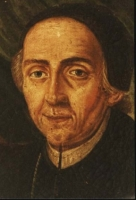
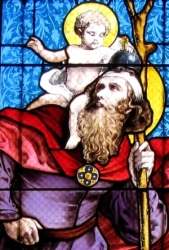
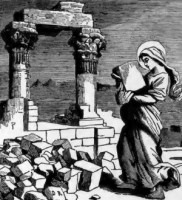


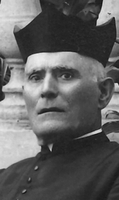
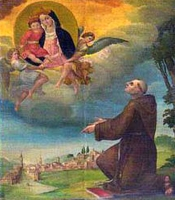

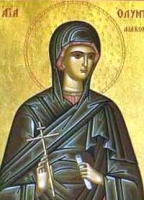







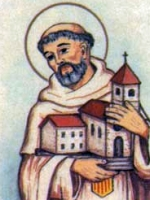




No comments:
Post a Comment